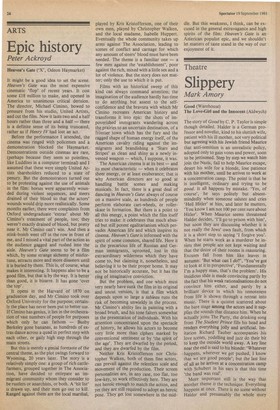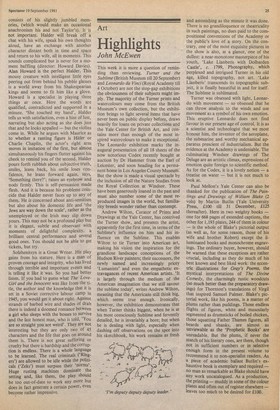Theatre
Slippery
Mark Amory
Good (Warehouse) The Love-Girl and the Innocent (Aldwych) The story of Good by C. P. Taylor is simple though detailed. Haider is a German professor and novelist, kind to his sluttish wife, patient with his ill mother, not very political but agreeing with his Jewish friend Maurice that anti-semitism is an unrealistic policy, adopted only to gain votes and power, soon to be jettisoned. Step by step we watch him join the Nazis, fail to help Maurice escape, desert his wife for a blonde, lose patience with his mother, until he arrives to work at a concentration camp. The point is that he is intelligent, ordinary and trying to be good. It all happens by mistake. 'Yes, of course', he says politely but absentmindedly when someone salutes and cries 'Heil Hitler' at him, and later he mutters, 'You know I am not 100 per cent sure about Hitler'. When Maurice seems threatened Haider decides, 'I'll go to prison with him', but soon they are discussing whether it is not really the Jews' own fault, from which it is a short step to saying 'I forgive you'. When he starts work as a murderer he insists that people are not kept waiting and that the decor of their rooms is reassuring. Excuses fall from him like leaves in autumn: Tut what can I do?', 'You've got to look at it in perspective', 'Fundamentally I'm a happy man, that's the problem'. His insidious slide is made convincing partly by the fact that his weak rationalisations do not convince him either, and partly by a brilliant device in which his remoteness from life is shown through a retreat into music. There is a quintet scattered about the bare stage among the actors and it supplies the sounds that distance him. When he actually joins The Party, the drinking song from The Student Prince fills his head and renders everything jolly and artificial. Imitation Richard Tauber accompanies Ills love scenes, yodelling and jazz do their bit to keep the outside world away. A key line near the end is said to his blonde: 'Whatever happens, wherever we get pushed, I know that we are good people'; but the last line of all as he arrives at a concentration camp with Schubert in his ears is that this time 'the band was real'.
More important still is the way that another theme is the technique. Everything happens at once. There is no scene without Halder and presumably the whole story consists of his slightly jumbled memories, (which would make an occasional anachronism his and not Taylor's). It is not important. Halder will break off a chat with his wife, speak his own thoughts aloud, have an exchange with another character distant both in time and space and return to his wife, all in moments. This sounds complicated but is never for a moment baffling (director: Howard Davies). Alan Howard is the perfect Halder. This mousy creature with intelligent little eyes peering out from behind his pebble glasses is a world away from his Shakespearian kings and seems to fit him like a glove. Howard is a specialist in playing three things at once. Here the words are qualified, contradicted and supported in a minute. 'She touched my hand', Halder tells us with satisfaction, even a hint of lust, narrating but also acting as she does just that and he looks appalled — but the violins come in. While he argues with Maurice as to whether a ranting figure is Hitler or Charlie Chaplin, the actor's right arm moves in imitation of the first, but almost simultaneously his fingers flutter against his cheek to remind you of the second. Haider pours forth rubbish about subjective truth, smiles, leans back, his smile loses confidence, he leans forward again, says, 'Something there?'; raises an eyebrow and nods firmly. This is self-persuasion made flesh. And it is because his problems coincide that Haider never faces up to any of them. He is concerned about anti-semitism but also about his domestic life and 'the Jews are way down the scale', rather as the unemployed or the Irish may slip down yours. This may not be a profound play but it is elegant, subtle and observant with moments of delightful complexity, a brilliant central performance and several good ones. You should not be able to get tickets, but try.
Solzhenitsyn is a Great Writer. His play gains from his stature. Here is a man of proven courage and integrity, who has lived through terrible and important events and is telling it like it was. So you had better listen. If you had to guess what The LoveGirl and the Innocent was like from the title, the author and the knowledge that it is set in a Soviet corrective labour camp in 1945, you would get it about right. Against strands of barbed wire and shades of drab there is indeed a doomed romance between a girl who sleeps with the bosses to survive and the last honest man, who is told, 'You are so straight you are weird'. They are not interesting but they are only two of 45 characters and the life that goes on around them is. There is not great suffering or cruelty but there is hardship and the corruption is endless. There is a whole language to be learned. The real criminals ('Ringers') are allowed to be idle while the politicals ('Zeks') must surpass their 'norms'. Huge rusting machines dominate the setting and, like them, the play should be too out-of-date to work any more but does in fact generate a certain power, even become rather impressive.



































 Previous page
Previous page